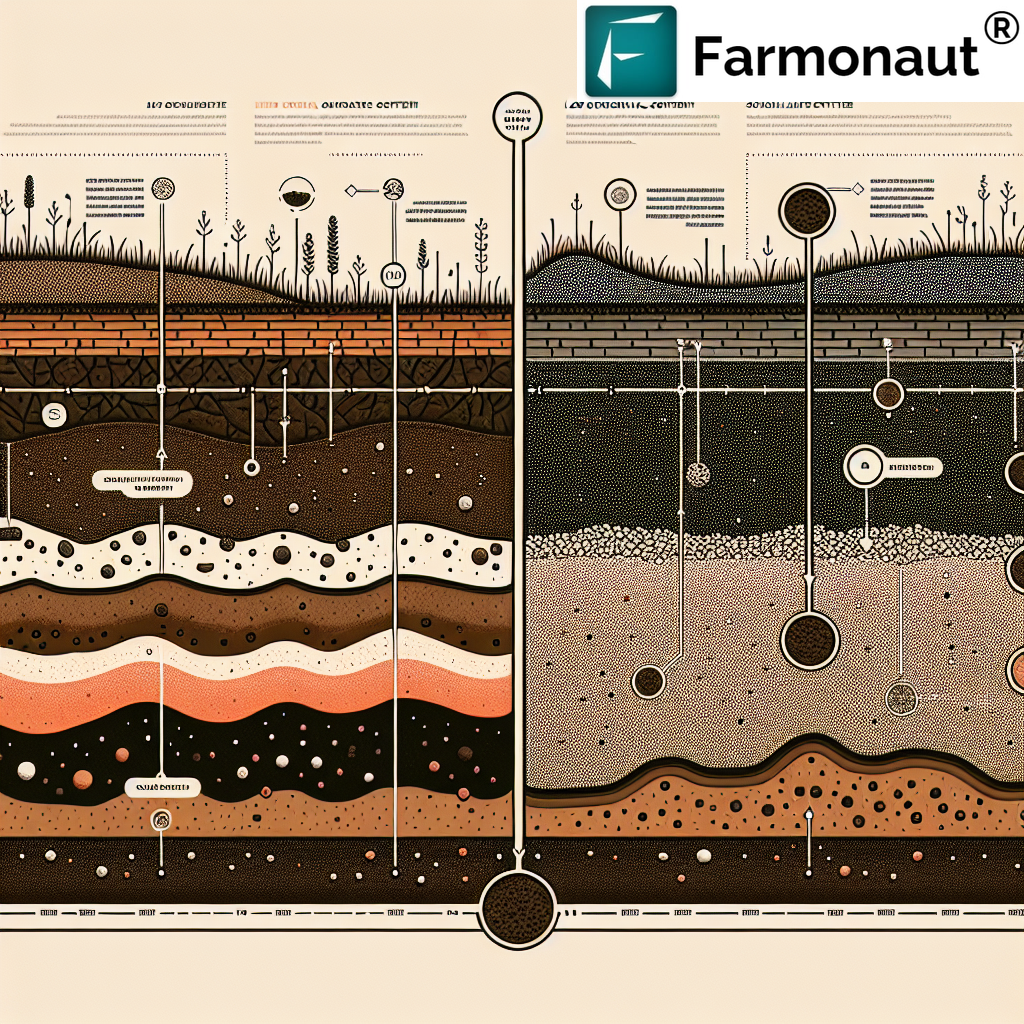Carrot Fertility Careers, Insurance & Cultivation 2025: Advancing Agricultural Sustainability, Security, and Opportunity
Meta Description: Explore carrot fertility careers, insurance, and cultivation in 2025. Discover soil management innovations, tailored crop insurance, and expanding career opportunities in agriculture.
“Over 40% of carrot farms in 2025 will adopt AI-driven soil fertility management for improved yield and sustainability.”
Table of Contents
- Introduction: The Vital Segment of Carrot Cultivation in 2025
- Carrot Fertility: Innovations for Optimal Soil and Crop Health
- Carrot Insurance: Risk Mitigation Amid Climate Challenges
- Expanding Carrot Fertility Careers and Opportunities
- Comparative Technology & Outcomes Table
- Advanced Satellite Solutions from Farmonaut
- Future Trends: Sustainability, Food Security, and Innovation
- FAQs: Carrot Fertility, Insurance & Careers
- Conclusion
1. Introduction: The Vital Segment of Carrot Cultivation in 2025
Carrot cultivation remains a vital segment of the global agricultural landscape, serving as both a nutritive vegetable and a profitable cash crop. In 2025, the agriculture sector experiences rapid transformation, propelled by advanced technology, increasing climate variability, and a growing demand for sustainable food security. This blog delves deep into the interplay between carrot fertility, specialized insurance solutions, and expanding careers—all intersecting to shape the future of carrot farming worldwide.
The nuances of carrot fertility careers, carrot insurance fertility, and carrot cultivation are more critical than ever. As farmers, agribusinesses, and policymakers seek sustainable growth, understanding advanced soil management, risk-mitigating insurance products, and new opportunities in farming becomes essential for thriving in an evolving agricultural sector in 2025 and beyond.
Why Focus on Carrot Cultivation in 2025?
- Carrots are a globally cultivated, highly nutritious root vegetable critical for food security.
- Technological advancements are redefining yield optimization, crop protection, and resource management.
- Insurance and innovative careers are transforming the carrot farming landscape into a modern, resilient, and attractive sector.
As we explore these dynamics, we will also highlight new tools—like satellite-based crop monitoring and AI-driven advisory solutions—that empower farmers and stakeholders for sustainable success in carrot cultivation, fertility, and careers.
2. Carrot Fertility: Innovations for Optimal Soil and Crop Health
Carrot Fertility Careers and Soil Health Management
Optimum fertility management is the foundation for high-quality carrot cultivation. Carrots thrive best in well-drained, sandy loam soils rich in organic matter, with a preferred pH range of 6.0 to 6.8. Keeping soil fertility at optimal levels involves balanced nutrient management—with a precise focus on nitrogen (N), phosphorus (P), potassium (K), and crucial micronutrients like boron and zinc.
Consistent fertility is pivotal for achieving high crop yields and ensuring the quality of carrot roots. Both deficiencies and excesses of these nutrients can trigger suboptimal growth, excessive foliage, poor root formation, or defective yields. Thus, precision and tailored approaches are necessary in 2025’s competitive landscape.
2.1 Technological Advancements in Fertility Management for Carrots
- Sensors and Remote Monitoring:
Modern soil sensors and remote monitoring systems deliver granular, real-time insights on soil nutrient content, moisture, and microbial activity. These tools empower farmers to apply nutrients and water only where (and when) required—maximizing fertility while reducing waste. - Precision Agriculture Systems:
Data-driven systems optimize fertilizer and irrigation schedules based on soil and crop needs. Automated equipment linked to satellite or AI analytics helps execute precise, variable-rate applications. - Integrated Nutrient Management:
Combining organic manures, biofertilizers, and chemical nutrients is a best-practice approach for sustaining soil structure and enhancing microbial activity, further promoting nutrient uptake and soil vitality. - Cover Cropping & Rotation:
Crop rotation and cover crops (like legumes) not only fix atmospheric nitrogen but also reduce disease outbreaks, maintain fertility, and sustain the health of sandy or loam soils through organic matter return. - AI-Based Fertility Advisory Systems:
Artificial intelligence in 2025 analyzes soil, crop and satellite data to recommend customized fertility regimes, helping farmers make evidence-based decisions and avoid over-application or nutrient deficiencies.
2.2 Scientific Insights: Nutrient Requirements for 2025 Carrot Cultivation
Let’s break down the essential nutrients and their impact:
- Nitrogen (N):
Stimulates healthy foliage. Excess nitrogen causes abundant leaves but poor root quality. - Phosphorus (P):
Promotes root formation—especially vital in early growth phases. - Potassium (K):
Boosts stress tolerance and root quality (color, sugar content). - Boron and Zinc:
Critical for preventing disorders like cavity spot and forked roots. Boron deficiencies are common in sandy soils and must be corrected early.
In 2025, advancements in soil testing, micronutrient management, and precision application will help farmers maximize both environmental sustainability and yield. Greater accessibility to such technological innovations will directly contribute to more resilient carrot production systems.
2.3 Fertility Monitoring: Satellite Data and AI Advisory
Among the latest tools, satellite-based platforms, such as those from Farmonaut, offer real-time field monitoring via multispectral imagery—detecting crop health anomalies, nutrient deficiencies, and even early signs of pest outbreaks. Through Farmonaut’s Jeevn AI Advisory System, farmers receive personalized recommendations on fertility management, irrigation, and pest avoidance for carrots. This digital shift is pivotal for advancing sustainable carrot cultivation.
Discover more about large-scale farm management solutions for optimizing field operations and leveraging satellite-driven insights to boost productivity.
2.4 Environmental and Economic Advantages
- Reduced Input Costs: Targeted nutrient application cuts fertilizer expenses and minimizes runoff losses.
- Enhanced Yield and Quality: Balanced fertility ensures uniform, high-quality carrot roots that fetch premium market prices.
- Sustainability: Precision agriculture benefits both the environment and the agro-economy by decreasing excessive input usage and maintaining soil health.
- Compliance with Food Security Standards: Traceable, documented fertility management supports regulatory and food safety requirements for local and global markets.
As fertility strategies continue to evolve, they will define the competitive edge for carrot growers, opening up new carrot fertility careers in soil analysis, remote sensing, AI advisory, and environmental stewardship.
3. Carrot Insurance: Risk Mitigation Amid Climate Challenges
“Carrot cultivation insurance policies are projected to grow by 35% in 2025, covering new technological and climate risks.”
In the era of climate variability, carrot cultivation faces frequent threats: droughts, floods, heatwaves, novel pest outbreaks, and market price fluctuations. Insurance is becoming increasingly critical in 2025, offering financial protection against these risks and empowering farmers to sustain operations through unpredictable seasons.
3.1 The Modern Landscape of Carrot Insurance Fertility
- Yield-Based Insurance: Protects against reduced production due to climate-induced losses—such as early bolting, root diseases, or unplanned pest infestations.
- Parametric or Index Insurance: Pays out when specific weather parameters (temperature, rainfall, humidity) exceed loss-triggering thresholds, particularly useful for addressing frequent droughts and floods.
- Market Price Coverage: Insures against severe price drops post-harvest, ensuring farmers can maintain cash flow.
- Technology & Quality Failure Cover: New products are emerging to cover failures in irrigation, sensor or data systems, and even contracted carrot quality standards.
Policies are now tailored to the unique needs of carrot growers, with specialized products that:
- Cover losses due to specific diseases and physiologic disorders (e.g., Alternaria leaf blight, root cracking, or pest-induced damages)
- Address financial shortfalls from failed adoption of innovations (e.g., faulty remote monitoring or smart irrigation)
3.2 Digitalization and Insurance Access in 2025
Modern carrot insurance platforms now integrate with digital apps. Growers register fields, digitally monitor crop condition, and submit claims—all through their smartphones. Satellite imagery (as delivered by Farmonaut) and AI-powered yield prediction models provide insurers with rapid, transparent claim verification and settlement.
Such digitalization reduces fraud and speeds up claim processes, with additional government-supported subsidies widening adoption. These innovations not only lower insurance costs but also enhance sector-wide resilience.
Find more about satellite-based crop insurance verification—essential for lenders and growers ensuring the credibility of claims in modern farming.
3.3 What Risks Will Carrot Insurance Cover in 2025?
- Natural Calamities: Drought, flood, hail, and early frost-induced crop loss.
- Agronomic Challenges: Soil-borne diseases, pest outbreaks, poor germination, and physiological disorders.
- Technological Malfunctions: Precision tech failure impacting irrigation, fertilization, or data-driven management systems.
- Market Fluctuations: Unforeseen price drops, logistics disruptions, or trade embargoes impacting crop value.
3.4 Impact on Smallholder and Large-Scale Farmers
- Smallholders: Affordable microinsurance products expand coverage to even the smallest carrot plot, helping protect livelihoods and incentivizing innovation adoption.
- Large Operations: Comprehensive policies cover multiple fields, supply chain interruptions, and even quality assurance defaults—integral for farms scaling up in the global market.
By 2025, insurance enhancements provide a foundation for sustainable carrot cultivation and support climate-smart carrot fertility careers in risk analysis, insurance sales and management, and remote verification.
4. Expanding Carrot Fertility Careers and Opportunities
Modern carrot cultivation in 2025 is an ecosystem of multidisciplinary opportunities—far beyond traditional fieldwork. Careers now span crop fertility optimization, AI integration, data analytics, insurance, and value-added product innovation. Let’s explore the landscape:
4.1 High-Demand Careers in Carrot Fertility Management
- Agronomists (Root Vegetable Specialists):
Experts in soil fertility careers, they diagnose and optimize nutrient regimes for different carrot genotypes and agroecologies, helping farmers achieve high yields and minimize pest risks.
Precision Agriculture Technicians:
Responsible for installing, maintaining, and interpreting data from sensors, satelite-driven management systems, and automated irrigation or fertilization equipment.- Soil Scientists & Microbiologists:
Analyze soil quality and microbial activity using advanced techniques, guiding the implementation of tailored organic and chemical amendments.
4.2 Careers in Carrot Insurance and Risk Management
- Insurance Underwriters & Risk Analysts: Evaluate data from satellite and field sources to structure carrot-specific insurance products, price schemes, and optimize claim algorithms.
- Claims Adjusters (Remote Verification): Use satellite imagery and field-level data to assess insurance claim validity, speeding up settlements for farmers.
- Product Developers and Policy Innovators: Design creative insurance offerings to address emerging risks in carrot cultivation.
4.3 Research & Development, Sustainability, and Beyond
- Geneticists/Breeders:
Develop disease-resistant and climate-smart carrot varieties ideal for different soils and ecological stressors. - Post-Harvest Technologists:
Work on packaging innovations, cold-chain solutions, and minimizing loss during transportation—crucial for fresh carrot exports. - Extension Officers:
Link cutting-edge research to practical field applications. They train farmers in the latest fertility management and insurance trends. - Nutraceutical and Food Startup Entrepreneurs:
Leverage carrot value for developing health foods, beverages, and supplements—tapping into both local and global high-value markets.
Explore more on how blockchain traceability can elevate carrot product provenance with Farmonaut’s product traceability solutions—vital for export and quality assurance.
Join the next wave of agricultural professionals and explore affiliate earning careers with Farmonaut.
4.4 Ecosystem Support: Resource and Fleet Management
- Fleet Managers: Optimize movement of machinery, inputs, and harvested roots using modern, satellite-based fleet management tools. This directly impacts carrot yield and profitability.
- Environmental Auditors: Monitor carbon footprinting and sustainability reporting—especially vital for carrot farms serving eco-conscious markets. Learn more about carbon footprinting solutions by Farmonaut.
5. Comparative Technology & Outcomes Table
To guide decisions in 2025, here’s a side-by-side look at key technologies, their impact, costs, coverage, and created roles—all focused on carrot cultivation, fertility, and insurance:
| Innovation / Technology | Estimated Yield Improvement (%) | Insurance Coverage Type | Estimated Cost (USD/acre) |
Career Opportunities Created |
|---|---|---|---|---|
| Soil Sensors & Remote Monitoring | +22-35% | Tech Failure, Yield Loss | 250-400 | Sensor Technicians, Data Analysts |
| AI-based Fertility Advisory | +18-28% | Input Failure, Disease | 70-150 (service) | AI Agronomists, App Developers |
| Integrated Nutrient Management (incl. Biofertilizers) | +12-19% | Process, Quality Loss | 60-110 | Soil Scientists, Field Trainers |
| Satellite-based Crop Monitoring | +25-30% | Weather, Yield, Quality | 15-30 (subscription) | Remote Sensing Experts |
| Blockchain Traceability | 2-7% (premium) | Product Authenticity | 25-70 | Supply Chain Auditors |
| Weather-indexed Microinsurance | Yield stability | Drought, Floods, Heat | 10-25 (premium) | Insurance Agents, Data Analysts |
6. Advanced Satellite Solutions from Farmonaut
As carrot cultivation and fertility management become more high-tech and data-centric, Farmonaut offers advanced digital tools to monitor, advise, and manage all aspects of modern farming:
- Satellite-Based Crop Monitoring:
Farmonaut provides real-time remote monitoring of carrot fields, using multispectral imagery to assess soil health, crop vigor, and detect early signs of disease or nutrient stress. This supports farmers in making informed, timely choices that reduce risks and optimize yield. - Jeevn AI Advisory System:
Farmonaut’s AI-driven tools offer carrot-specific weather forecasts, tailored irrigation and nutrition advice, and instant anomaly detection. This enables precision agronomy throughout the carrot crop lifecycle. - Blockchain-Based Traceability:
For export and quality assurance, our traceability systems guarantee product authenticity and compliance with food safety via immutable blockchain records—enhancing market value and trust. - Satellite-Verified Crop Insurance:
Our platform strengthens the reliability and accessibility of agricultural insurance products through rapid, remote field verification—reducing fraud and expediting claims. - Fleet & Resource Management:
Leverage Farmonaut’s fleet management solutions to coordinate resource use, schedule input distribution, and optimize logistics for large and small carrot farms. - Environmental Footprint Tracking:
Our carbon footprinting tools guide carrot growers to monitor and mitigate emissions, satisfying consumer and regulatory demands for sustainable agriculture. - API & Developer Access:
For businesses building custom carrot farm tools or integrating satellite insights, use our Farmonaut API and see the detailed developer documentation for seamless integration.
7. Future Trends: Sustainability, Security, and Innovation in Carrot Cultivation
- Increased AI Adoption: With over 40% of farms projected to adopt AI-driven fertility and risk management, tech-savvy professionals will be increasingly in demand.
- Wider Insurance Scheme Coverage: Carrot farming insurance will expand to cover cyber and digital risks, tech deployment failures, and climate-induced biological threats.
- Climate-Smart Practices: Greater use of regenerative, low-carbon, and circular agri-models will align with food security and global climate goals.
- Data-Driven Audits and Compliance: Global export compliance will tightly link with blockchain traceability and satellite-verified cropping histories.
These trends not only improve resilience but also drive carrot fertility careers in data analytics, sustainability, insurance, and global supply chain management.
8. Frequently Asked Questions (FAQs)
Q1: What is the best soil type for carrot cultivation in 2025?
Answer: Carrots perform best in well-drained, sandy loam soils rich in organic matter with a pH range of 6.0–6.8. Proper texture and structure reduce root deformation and help maximize nutrient uptake.
Q2: What are the top innovations in carrot fertility management?
Answer: Key technologies for 2025 are real-time soil sensors, satellite monitoring, AI-driven advisory systems, and integrated organic and biofertilizer applications for sustained fertility and root quality.
Q3: Which carrot insurance products are most relevant for 2025?
Answer: Modern carrot insurance offers yield-based, parametric (weather-indexed), input/tech failure, and price fluctuation policies—all increasingly compressed into affordable digital products for various farm sizes.
Q4: How do satellite data and AI benefit carrot fertility careers?
Answer: Careers now include data analysts, AI agronomists, and remote sensing experts who use advanced tools to interpret soil, climate, and crop signals, helping farmers make smarter decisions and improve yields.
Q5: Where can I access top tools for carrot cultivation management?
Answer: Tools like Farmonaut provide user-friendly platforms for monitoring, reporting, and making informed decisions using satellite and AI.
9. Conclusion: The Future of Carrot Fertility Careers & Sustainable Cultivation
In 2025 and beyond, carrot cultivation embodies the intersection of fertility innovation, robust insurance protection, and dynamic career opportunities. As new challenges emerge—be it from climate change, evolving consumer standards, or technological shifts—farmers and professionals must adopt advanced, sustainable practices to stay resilient and profitable.
Stakeholders leveraging AI, sensors, satellite monitoring, digital insurance, and traceability will be best positioned for growth, stability, and leadership in the modern agricultural sector. Whether it’s optimizing soil health, mitigating risks through tailored insurance, or capitalizing on the expanding ecosystem of carrot fertility careers, the future is bright for those ready to innovate and adapt.
Let’s continue advancing carrot cultivation for a more sustainable, secure, and opportunity-rich food system.
Further Reading:
- How carbon footprint tracking shapes carrot cultivation for climate-smart agriculture
- Ensuring food security and export value with blockchain traceability
- Optimizing fleet and input distribution for large-scale carrot farming
Copyright © 2025 Farmonaut | Empowering Modern Agriculture with Satellite, AI & Blockchain Solutions











